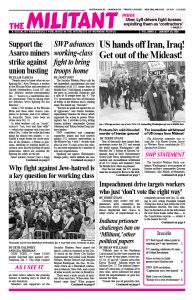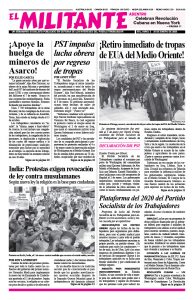January 23, 1995
DES MOINES, Iowa — Thousands of rubber workers on strike against Bridgestone/Firestone here and in Decatur, Illinois; Noblesville, Indiana; and Oklahoma City, Oklahoma, voted overwhelmingly to continue their strike against the tire giant.
Several days earlier the company had announced it would fire hundreds of striking workers, giving no reason for who was and who was not dismissed.
Strike demands center on Firestone’s insistence on pay cuts; a 7-day, 12-hour continuous shift; removal of cost-of-living protection; and elimination of the union’s safety committee.
“There’s no way a tire builder can work 12 hours a day — over and over lifting tires that weigh 25 to 60 pounds on and off the machine,” striker Bob Fischer told the Militant outside the meeting of United Rubber Workers Local 713 in Decatur.
January 23, 1970
The murders of Joseph A. Yablonski, his wife and daughter, sent tremors through the union movement and brought large numbers of miners out of the pits in mourning — and with a new determination to change the conditions of their lives and the character of the United Mine Workers union.
After the first shock of the awful crimes, miners began walking away from their jobs. In the week before the burial, surveys showed 20,000 miners were out at more than 30 mines in southwestern Pennsylvania, eastern Ohio, and northern West Virginia. At a meeting in Monongah, W.Va., leaders of Yablonski’s campaign for the presidency of the UMW called for a nationwide strike “until some arrests are made.”
Yablonski’s attempt to unseat UMW President W.A. Boyle was made possible by the deep dissatisfaction within the ranks of the unions.
January 20, 1945
The current drive for a national service law to conscript labor for work in private industry aims to utilize the repressive machinery of government to chain workers to their jobs at frozen wages. Under a forced labor law, the unions would be paralyzed, strikers would be jailed or herded into concentration camps, workers would be placed at the mercy of their exploiters.
Since the beginning of the war, anti-labor legislation has wiped away many of the social gains of the past decades. Anti-labor executive decrees have supplemented this legislative assault.
The workers do the fighting, dying and paying for the war, while the capitalists coin fabulous profits out of the agony of humanity. It is this system which the capitalist rulers are determined to preserve by crushing the organizations and institutions of the working class.

